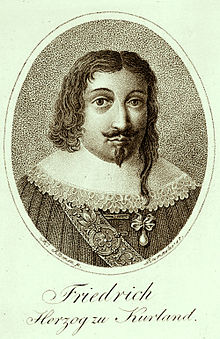Friedrich Kettler
Friedrich Kettler | |
|---|---|
| Duke of Courland and Semigallia | |
 | |
| Reign | 1587–1642 |
| Predecessor | Gotthard Kettler |
| Successor | Jacob Kettler |
| Born | 25 November 1569 Mītava, Duchy of Courland and Semigallia |
| Died | 17 August 1642 (aged 72) Mītava, Duchy of Courland and Semigallia |
| Buried | Ducal crypt in the Jelgava Palace |
| Noble family | Kettler |
| Spouse(s) | Elisabeth Magdalena of Pomerania |
| Father | Gotthard Kettler |
| Mother | Anna of Mecklenburg |
Friedrich Kettler (Latvian: Frīdrihs Ketlers, 25 November 1569 in Mītava (German Mitau, now Jelgava) – 17 August 1642) was Duke of Courland (Latvian: Kurzeme, now part of Latvia) from 1587 to 1642.
He was the son of Gotthard Kettler, the first Duke of Courland. Until 1616, he ruled only the eastern Zemgale portion of the Duchy of Courland, while his younger brother Wilhelm Kettler ruled the western Courland portion. Friedrich ruled the entire Duchy from 1616 when his brother emigrated due to conflicts with the nobility.
Biography
Friedrich Kettler was born to Gotthard Kettler and his wife Anna of Mecklenburg. The first of two sons, Friedrich in his youth had a good education travelled to many other European countries. According to Gotthard Kettler's will, the Duchy was to be divided between his two sons. After his father's death in 1587, Friedrich and his younger brother Wilhelm became co-rulers of the Duchy. After Wilhelm reached majority in 1596, the Duchy was officially partitioned into its Courland and Semigallian parts.
During Polish-Swedish War, Duke Friedrich and Wilhelm led their troops in battles against the Swedes, with Friedrich leading 300 big cavalry units in the Battle of Salaspils (1605). During the war, Courland aristocracy grew in their resistance to the ruling Kettler brothers.
In 1617, the Regional Assembly of Courland (Landtag) sat in Skrunda Castle and decided that Duke Wilhelm be stripped of title and banished from the Duchy. The following year, Friedrich was elected sole Duke of Courland, and he approved a new constitution, Formula Regiminis, which gave greater rights to the aristocracy. Among the new parameters set by this constitution were that The Duke cannot implement decisions without the prior consent of the Duchy's council, thus making Courland a constitutional monarchy.
In 1622, The Duke's residence in Jelgava was surrounded by the Swedish army, forcing Friedrich to move to Kuldiga.
Issue
Friedrich Kettler married Elisabeth Magdalena of Pomerania in 1600. They did not have issue, so in 1625, he proposed that Wilhelm's son Jacob be recognised as heir. The Duchy's council agreed to this proposal and Jacob was made co-ruler in 1638.
Sources
- Heinz Mattiesen (1961), "Friedrich Kettler", Neue Deutsche Biographie (in German), vol. 5, Berlin: Duncker & Humblot, p. 513; (full text online)
